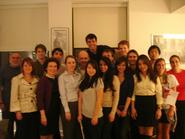
People are rational, and they always make cold, calculating decisions to maximize their utility. That's the assumption that neoclassical economics makes, but it's exactly what Bank of New York Mellon Wealth Manager Delia Marshall challenged in a talk to NYC Program students on neuro-economics.
Marshall, who graduated from New York University with a degree in psychology, explained that this new discipline is the intersection of neuroscience, psychology, and economics. So while traditional economics presumes emotionless agents who systematically evaluate their constraints and select the best option, neuro-economics explores the human side of choice. "If we're so self-maximizing, why is the savings rate less than 1%?" Marshall observed. She explained that the economy is excessively dependent on consumers, who comprise two-thirds of the economy, but that these consumers are confused by mixed messages on whether to spend more or save more.
According to Marshall, the more-advanced, measured prefrontal cortex normally controls thinking, but its primitive and emotional counterpart, the amygdala, often short-circuits rational decision-making. Money triggers the brain's fight or flight response, she noted, as if responding to mortal danger. Marshall cited other studies showing that the brains of individuals making money are indistinguishable from those of individuals engaging in addictive vices like drugs. And just like drugs, it takes more the next time to have the same effect. Thus, given the role that emotions play in economic choices, Marshall explained that it is important to step back from impulses and make thoughtful, responsible financial decisions.
-- by David Foster '10
New York City Program
Marshall, who graduated from New York University with a degree in psychology, explained that this new discipline is the intersection of neuroscience, psychology, and economics. So while traditional economics presumes emotionless agents who systematically evaluate their constraints and select the best option, neuro-economics explores the human side of choice. "If we're so self-maximizing, why is the savings rate less than 1%?" Marshall observed. She explained that the economy is excessively dependent on consumers, who comprise two-thirds of the economy, but that these consumers are confused by mixed messages on whether to spend more or save more.
According to Marshall, the more-advanced, measured prefrontal cortex normally controls thinking, but its primitive and emotional counterpart, the amygdala, often short-circuits rational decision-making. Money triggers the brain's fight or flight response, she noted, as if responding to mortal danger. Marshall cited other studies showing that the brains of individuals making money are indistinguishable from those of individuals engaging in addictive vices like drugs. And just like drugs, it takes more the next time to have the same effect. Thus, given the role that emotions play in economic choices, Marshall explained that it is important to step back from impulses and make thoughtful, responsible financial decisions.
-- by David Foster '10
